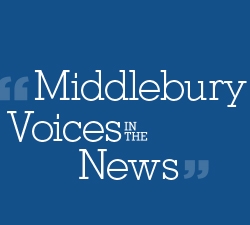Middlebury Voices in the News: Guggenheim Fellowship, Election Fundamentals, TV Storytelling

Professor of Geography Anne Knowles has been named a 2015 Guggenheim Fellow for her work “Telling the Spatial Story of the Holocaust.” Mapping the architecture of Auschwitz prompted new research questions for her. Knowles says, mapping “shows us what [the Nazis] built and did; it shows what their priorities were, rather than what they talked about. It sends a chill down the spine.” The fellowship is awarded each year to creative and exceptionally productive scholars, artists, and scientists.
Learn more about the Guggenheim Fellowship, or read Middlebury Magazine’s story about it, “Some Kind of Place: Auschwitz, Poland,” published in the Fall 2013 issue.
The Christian Science Monitor recently posed the question: What is more important in a political campaign–fundamentals or a stellar campaign? With former Secretary of State Hillary Clinton announcing her intentions to join the presidential race, various experts weighed in. Professor of Political Science Matthew Dickinson’s own voice factored into the discussion, “No turnout machine, no matter how sophisticated, can make much of a dent when the fundamentals mean you are moving electorally against a strong partisan headwind.”
Read, “Is Hillary a Great Campaigner? The Fundamentals Might Matter More,” published April 8, 2015.
What’s the deal with Seinfeld? Professor of Film and Media Culture Jason Mittell talks with Wisconsin Public Radio about the persisting influence of the popular 90s sitcom. With each episode detailing the misadventures of Jerry, George, Elaine, and Kramer, a complex form of televised storytelling was born that has led to the advent of contemporary shows such as the critically acclaimed Breaking Bad. “Viewers watched the story not just to see what happened, but to analyze and predict how the story will be told,” Mittell said.
Listen or read, “How ‘Seinfeld’ Ushered in a New Era of TV Storytelling,” “How ‘Seinfeld’ Ushered in a New Era of TV Storytelling,” published April 6, 2015.

